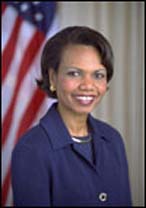Sept. 11 inquiry asks Rice: “What went wrong?”
Two and a half years after the Twin Towers collapsed into rubble. Two wars later. Fast approaching a new highly partisan election. The commission investigating 9/11 is still asking the question: What went wrong?
Under public pressure, the Bush Administration agreed to let Condoleezza Rice, the White House National Security Advisor, testify before the 10-member bipartisan fact-finding “National Commission on Terrorist Attacks Upon the United States” on April 8.
The commission’s goal is to find all relevant facts to the Sept. 11 tragedy and help suggest ways to defend against such attacks in the future.
The Bush Administration has also been facing a political firestorm with the recent testimony of Richard Clarke before the commission. Clarke, the former Chief of Counter-Terrorism made claims before the Commission that the Administration didn’t do enough to heed his warnings about al-Qaeda or to deal effectively with terrorism before 9/11.
“I think the thing that Mr. Clarke emphasized the most is a lack of attention by the Bush administration to the problem of terrorism,” said Thomas Kean, the commission’s chairman in a press conference.
“The most important outcome of these hearings is for we, as a country, to understand the breakdown in intelligence prior to 9/11,” said Ken Gilmore, chair of the Political Science department, “so we can have a better chance to prevent these tragedies in the future. It’s really disappointing the Bush administration is being so secretive.”
The White House had earlier refused to let Rice testify publicly, according to the New York Times. Recent charges by Clarke, the complaints of the Democratic Party, and public backlash has forced the administration change their decision. Rice had interviewed with the Commission earlier in closed, non-sworn sessions for almost four hours.
“I feel our government should be open and honest when possible,” said sophomore political science student Ali Stewart, “Clarke’s statements are a step in the positive direction, Rice’s are not.”
The Administration claimed it didn’t want to set up a precedent for the review of executive privilege.
“A President and his advisors, including his advisor for national security affairs, must be able to communicate freely and privately, without being compelled to reveal those communications to the legislative branch,” said Bush.
“I can understand the reasoning but I’m appalled by the Bush Administration,” said Gilmore. “It was sad they had to cut a deal.”
Last Monday, Commission Executive Director Philip Zelikow faxed a photo of FDR’s Chief of Staff William D. Leahy testifying before a commission investigating the attack on Pearl Harbor to the White House, according to CNN.com.
It was suggested that the 1945 testimony set a precedent for legislative review that the White House wishes to avoid with Rice’s testimony. The White House denies the photo was the reason for the turnabout.
According to the Washington Post, the White House released Rice to speak with the Commission as long as it didn’t set a precedent.
“The circumstances of this case are unique,” Bush said. “because the events of September the 11th, 2001, were unique.”
Clarke’s recently released book, Against All Enemies: Inside America’s War on Terror, discusses national security and the events leading up to the 9/11 attacks. He leveled accusations that led to the commission calling upon Rice to testify.
The commission also scheduled meetings with Bush and Vice President Dick Cheney,
“They asked to testify together, and we didn’t see how that compromised our investigation at all,” Kean said in his press conference. “We are going to ask the same questions and get the same answers.” The commission is scheduled to release its findings on July 26.
National News Briefs
American War Atrocities
The Council on American-Islamic Relations (CAIR) is asking the Pentagon to question recent army misconduct in Iraq. CAIR is raising questions over a photo of a U.S. soldier smiling with two Iraqi children. One of the children is shown holding a sign that reads, “Lcpl Boudreaux killed my dad, then he knocked up my sister”. CAIR is also concerned over an enlisted soldier’s letter claiming that his commanding officer had inappropriate conduct with Iraqi pre-pubescent girls. The allegations claim that the commander was provided girls in exchange for arranging Iraqi leaders U.S. protection.
Israel Begins Withdrawal Plan
Palestinian Prime Minister Mahmoud Abbas has agreed to discuss Prime Minister Ariel Sharon’s new “road map for peace” plan next month. Sharon proposed to leave all but six settlements in the West Bank and Gaza strip area. Accounts say that the removal is a positive step towards establishing a Palestinian state. The first action of the “road map” calls for Israel to halt new settlements and to dismantle existing settlements in Palestinian areas. In addition, the plan calls for Palestinians to halt terrorist activities against Israel.
Cheney in China about North Korea
Vice President Cheney thanked China for its efforts in convincing North Korea to stop its nuclear program. However, tensions are still high between the U.S. and China over issues such as Taiwan and Hong Kong. The Chinese Premier Wen Jiabao asked Washington to stop selling weapons to Taiwan, which China considers part of its territory. This visit is part of Cheney’s weeklong visit across Asia, he will spend three days in China, having already stopped in Japan and finishing with South Korea. The last time Cheney visited China, it was in 1995 as head of the oil service Haliburton.
Mice with Breasts
A new scientific process has been developed to grow human breast tissue in mice. The results of the mice research mice will be used to study breast cancer and test new cancer fighting drugs. The hope is that these breast mice can lead to greater knowledge about breast cancer in humans.

